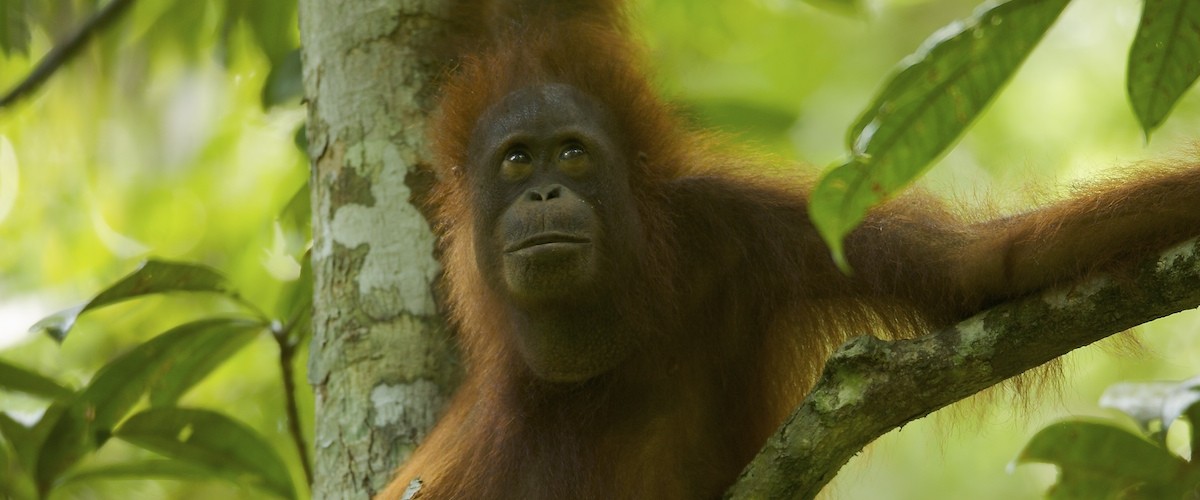By Natalie Robinson, Program Coordinator and Cheryl Knott, Executive Director
Although 2020 has been an unprecedented year in many ways, we’ve been fortunate to keep busy at GPOCP, and have made great strides towards the conservation of wild orangutans. To kick off the year, we held our annual meeting in January. Our conservation and research staff came together for a three-day meeting to share the accomplishments of the last year and discuss our goals for the coming year. Later that month, Sustainable Livelihoods Head Artisan, Ibu Ida, won a Disney Conservation Hero Award. We celebrated her years of hard work and her dedication to sharing her skill of weaving throughout the community and training the next generation of craftspeople.
In February, we finished a year-long field project to assess the size of the orangutan population in Gunung Palung National Park using a new methodology of matched ground and drone nest count surveys. Then, we began the next step of this study, with the analysis of drone imagery, collecting data on the presence of orangutan nests. We also launched our online membership program, Save Wild Orangutans, and the GP orangutans were featured in BBC’s Seven Worlds One Planet – Asia episode. Dr. Cheryl Knott’s work was also highlighted by Boston University.

COVID-19 then became a worldwide pandemic. As a result, in mid-March, GPOCP went virtual and we all learned to do our part to socially distance and #ActLikeAnOrangutan. Our Sustainable Livelihoods artisan groups joined forces to sew cloth masks at the onset of the pandemic. In total, they made over 6,000 masks to distribute throughout local villages. This generated a significant amount of income for the artisans, while also helping the community.
In April, we celebrated Earth Day as we were adjusting to this ‘new normal’, implementing new virtual ideas, and hosting a remote craft competition. The next month, we officially awarded six new West Bornean Orangutan Caring Scholarships. These hard-working students have now completed their first semester of university classes!

In June we celebrated World Rainforest Day and Executive Director, Cheryl Knott, spoke as a panelist during a virtual webinar. In July, we commenced a series of biodiversity surveys throughout each of our Customary Forests. These surveys aim to identify animal and plant species in forests that buffer the Park, while also training villagers on survey methods so that they can independently run such surveys in the future.
The next month, two new Customary Forests, in Batu Barat and Rantau Panjang villages, were officially recognized by the Ministry of Environment and Forestry. After a long, arduous process, the villages’ Management Boards are now permitted to supervise and utilize the Customary Forests for the next 35 years! We also celebrated World Orangutan Day with a poster design competition.

In September, the first environmental education and mobile health clinic event was held in Pengkalan Teluk Village, in collaboration with another local NGO, Alam Sehat Lestari (ASRI). Our team also wrapped up a survey at our Bentangor Environmental Education Center, assessing tree types and carbon content within the surrounding area. Schools in the Kayong Utara Regency opened back up in October, allowing some limited Environmental Education programming to resume.

In November, we resumed a survey from 2019, collecting data on Human-Orangutan Interactions (HOI) throughout 14 villages that border the National Park. We also celebrated Orangutan Caring Week, with events organized by our WBOCS recipients and volunteer youth group members. In the US, Boston University recent PhDs, graduate students and undergraduates virtually participated in the Northeastern Evolutionary Primatologists (NEEP) annual meeting, presenting on their orangutan research.
We’ve had an exciting end to the year, receiving many generous donations on Giving Tuesday. Long-time National Park counterpart, Endro Setiawan, began his Master’s thesis research in the partially degraded forest near the Rangkong River, outside of our main research area. Most recently, construction of the new Cabang Panti Research Station finished, and these buildings are now officially in use! The Gunung Palung National Park Bureau (BTN-GP) hosted an inaugural ceremony to celebrate the new camp alongside many of our long-term supporters, colleagues and collaborators (see the following article).
In total, our research team spent over 1900 hours following orangutans, collecting focal behavioral data on 35 different individuals. Researchers recorded observations of 13 orangutans that had not previously been studied in the Cabang Panti research vicinity. The field team also collected fecal and urine samples to study orangutan health and physiology. More than 350 new feeding trees were tagged, and we continued the long-term monitoring of two different phenological datasets throughout the research area.

The staff at Cabang Panti Research Station and the Yayasan Palung office have continued to persevere, step into new roles, and take on new challenges, despite the still ongoing pandemic. We are grateful for everyone’s hard work and are optimistic that the next year will bring even more successes!







